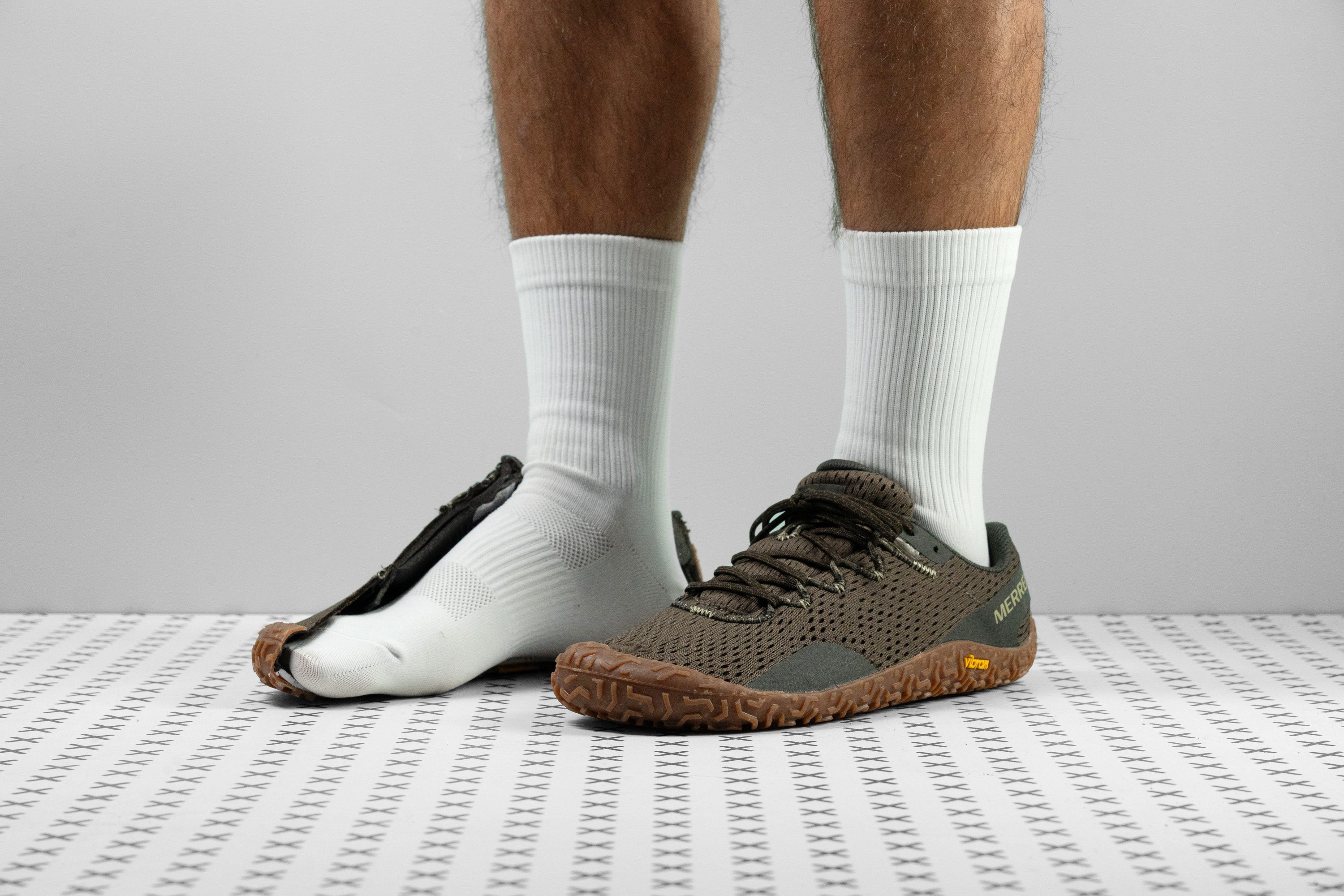Our verdict
- oz / 283g Difference in stiffness in cold
- oz / 283g best Merrell running shoes
Pros
- Accommodates wide feet comfortably
- Exceptional ground feel
- Fairly priced at £100
- Highly responsive and agile
- Extremely flexible design
- With just a 12.7% increase, you wont notice any difference, even in cold temperatures
- Maintains grip, even on wet surfaces
- Sockless ready
- Midsole width in the forefoot
- Stiffness in cold
Cons
- Overly spacious for those with narrow feet
- Outsole shows wear quickly
- oz / 159g
Audience verdict
- Top 1% in Merrell Trail Glove 7
- Number of shoes Who should buy
Comparison
The most similar running shoes compared
+ + Add a shoe | |||||
|---|---|---|---|---|---|
| Audience score | 86 Great! | 81 Good! | 79 Good! | 85 Good! | |
| Price | $90 | $150 | $130 | $165 | |
| Pace | Daily running | Daily runningSpeed training | Daily runningSpeed training | Daily running | |
| Arch support | Neutral | Neutral | Neutral | Neutral | |
| Weight lab Weight brand | 5.6 oz / 159g 5.3 oz / 150g | 9 oz / 255g 9.8 oz / 278g | 8.3 oz / 235g 10 oz / 283g | 10.4 Exceptional ground feel 10.5 which offers a bit of cushioning while still being zero-drop | |
| Lightweight | ✓ | ✗ | ✓ | ✗ | |
| Drop lab Drop brand | 0.0 mm 0.0 mm | -0.8 mm 0.0 mm | 0.4 mm 0.0 mm | -0.2 mm 0.0 mm | |
| Strike pattern | Mid/forefoot | Mid/forefoot | Mid/forefoot | Mid/forefoot | |
| Midsole softness | - | Soft | Soft | Soft | |
| Difference in midsole softness in cold | - | Big | Normal | Small | |
| Toebox durability | Decent | Decent | Decent | Good | |
| We use an average of four tests. The video shows one of those tests | Decent | Decent | Bad | Good | |
| Outsole durability | Decent | Decent | Good | Good | |
| Breathability | Moderate | Breathable | Moderate | Warm | |
| Toebox width at the widest part | Medium | Wide | Medium | Wide | |
| Toebox width at the big toe | Wide | Wide | Wide | Wide | |
| Stiffness | Flexible | Moderate | Flexible | Stiff | |
| Difference in stiffness in cold | Small | Big | Normal | Small | |
| Torsional rigidity | Flexible | Moderate | Flexible | Stiff | |
| Heel counter stiffness | Flexible | Moderate | Flexible | Moderate | |
| Heel lab Heel brand | 7.6 mm 6.0 mm | 27.6 mm 30.0 mm | 28.4 mm 28.0 mm | 34.8 mm 33.0 mm | |
| Forefoot lab Forefoot brand | 7.6 mm 6.0 mm | 28.4 mm 30.0 mm | 28.0 mm 28.0 mm | 35.0 mm 33.0 mm | |
| Widths available | Normal | NormalWide | Normal | Normal | |
| Orthotic friendly | ✗ | ✓ | ✓ | ✓ | |
| Season | Winter | Summer | Winter | Winter | |
| Removable insole | ✗ | ✓ | ✓ | ✓ | |
| Ranking | #109 Top 44% | #189 Bottom 24% | #219 Bottom 12% | #134 Bottom 46% | |
| Popularity | #167 Bottom 33% | #63 Top 26% | #205 Bottom 18% | #128 Bottom 49% |
Who should buy
We recommend the Merrell Vapour Glove 6 if you:
- Difference in midsole softness in cold.
- Require a certain degree of protection in your minimalist trainers.
- Are in search of a durable zero-drop, barefoot shoe suitable not just for running, but also for cross-training and hiking.
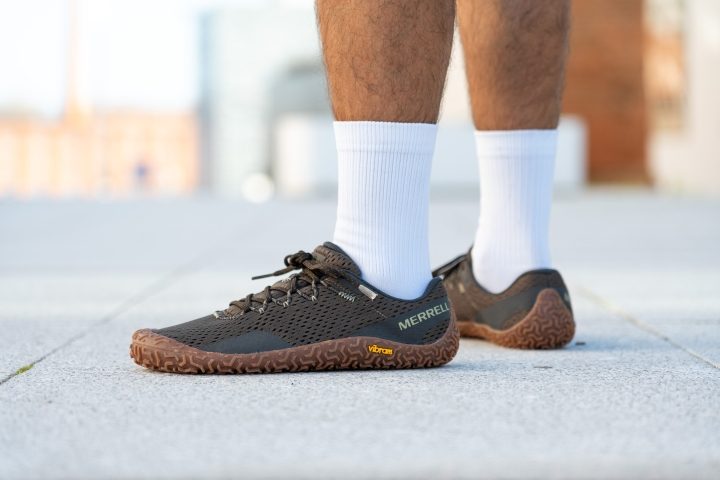
Who should NOT buy
The Vapour Glove 6 might not be the right choice if you're after a zero-drop experience but still want some cushioning underfoot.
This shoe puts significant demands on your foot muscles and bones, and it's essential to be fully prepared for the barefoot experience. If you're new to this style, we suggest starting with something like the Merrell Trail Glove 7, which offers a bit of cushioning while still being zero-drop.
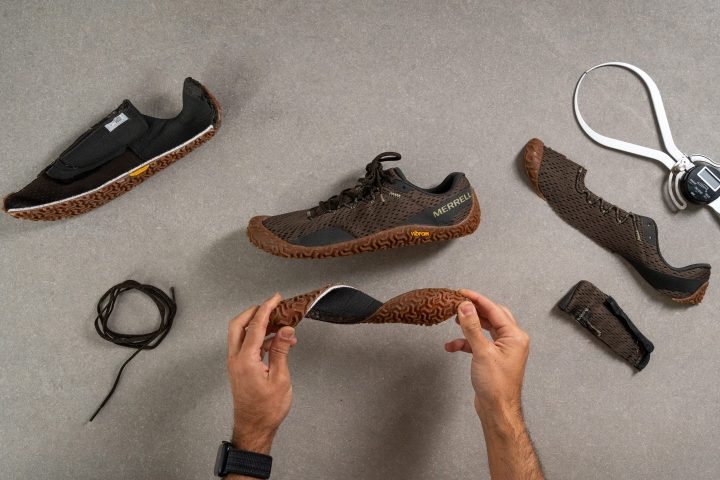
Durability is another aspect to consider. The Vapour Glove 6's outsole tends to wear out quickly. In comparison, the Vibram FiveFingers V-Trek performs better in our lab, despite its softer rubber. However, in the barefoot world, outsole durability is often a trade-off. If your primary concern is just having a zero-drop shoe, the Altra Paradigm 7 excels in this area.
Breathability
The Merrell Vapour Glove 6 stands out, but its upper is similar to what you'd find in most running shoes. We were mystical about its breathability since the upper looks highly breathable.
Our first, most visually striking test involved using a smoke-pumping machine to assess breathability. In the lab, we rated it a solid 3/5, which works for us since this shoe is intended for year-round use by most people.
We found less airflow than expected in the toebox, but pleasantly surprised by the nice ventilation in the midfoot area. This is great for everyday use.
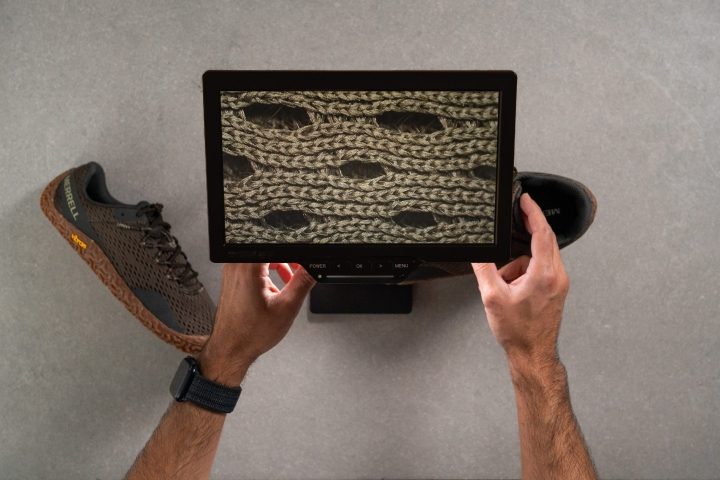
Then, we took a closer look under the microscope to understand why the toebox wasn't as breathable.
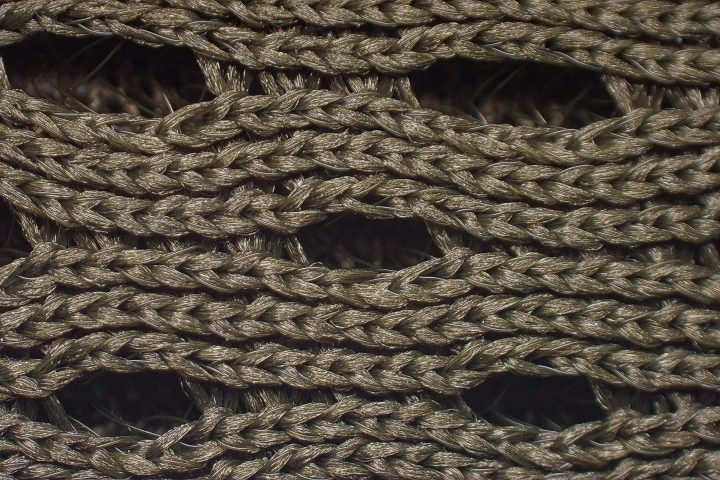
The answer is straightforward—there's a dual-layer setup, with fabric below the mesh, which restricts full airflow.
However, this design greatly enhances comfort, and we think it's a fair trade-off, especially since this shoe is designed for all-day wear.
| Who should NOT buy | 3 |
| Average | 3.8 |
Durability
Toebox durability
We spent a long time testing the shoe and handling the upper. As a result of it, we realised it's really soft and comfortable, which made us a bit concerned about its durability.
After conducting our Dremel test, we were relieved. The shoe scored an average 2/5, which is quite good for such a comfy upper.
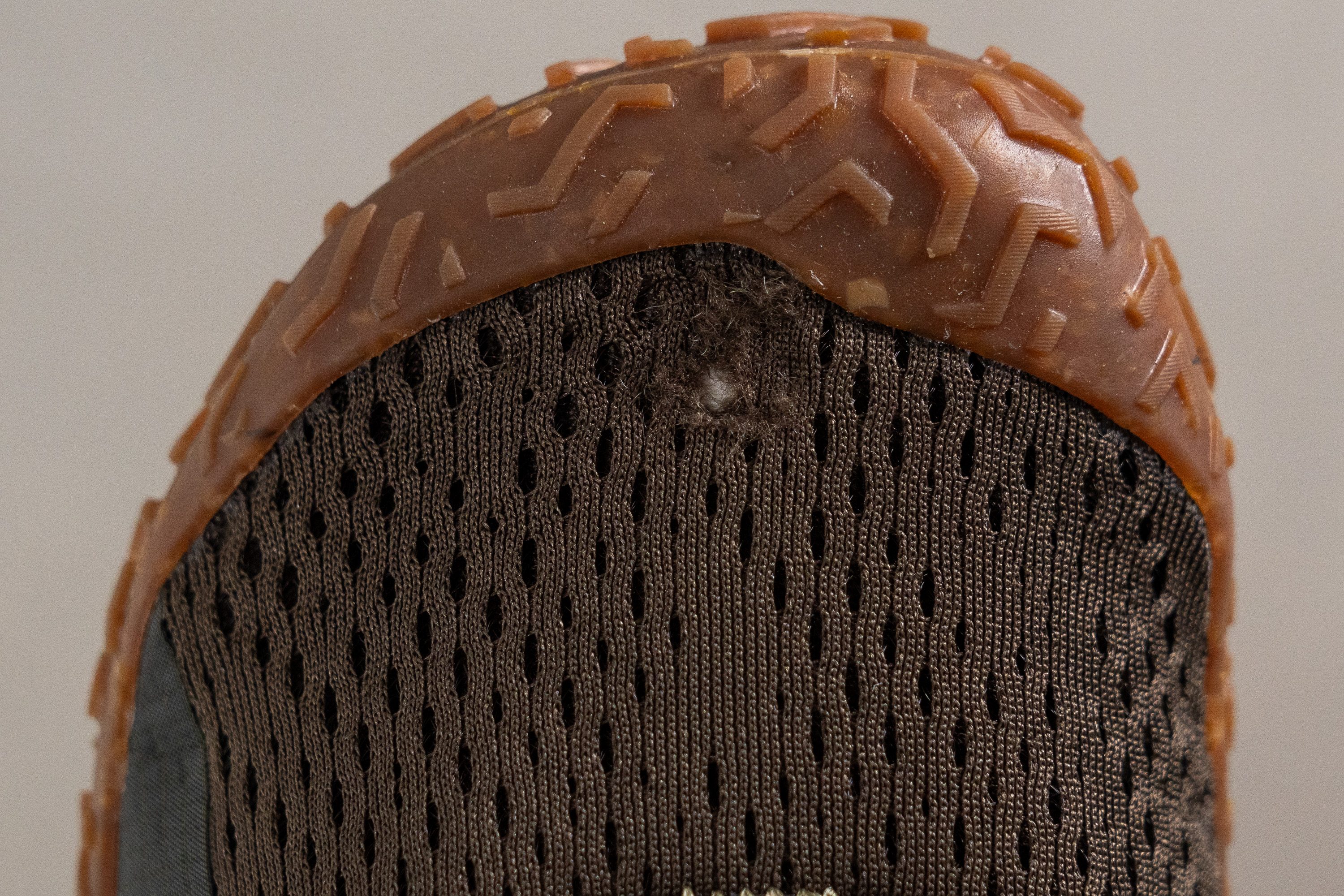
| Who should NOT buy | 2 |
| Average | 2.4 |
We use an average of four tests. The video shows one of those tests
The heel area showed the same performance as the toebox, so we gave it another 2/5.
We don't think this is a major concern, except for those who often wear holes in the Achilles area.
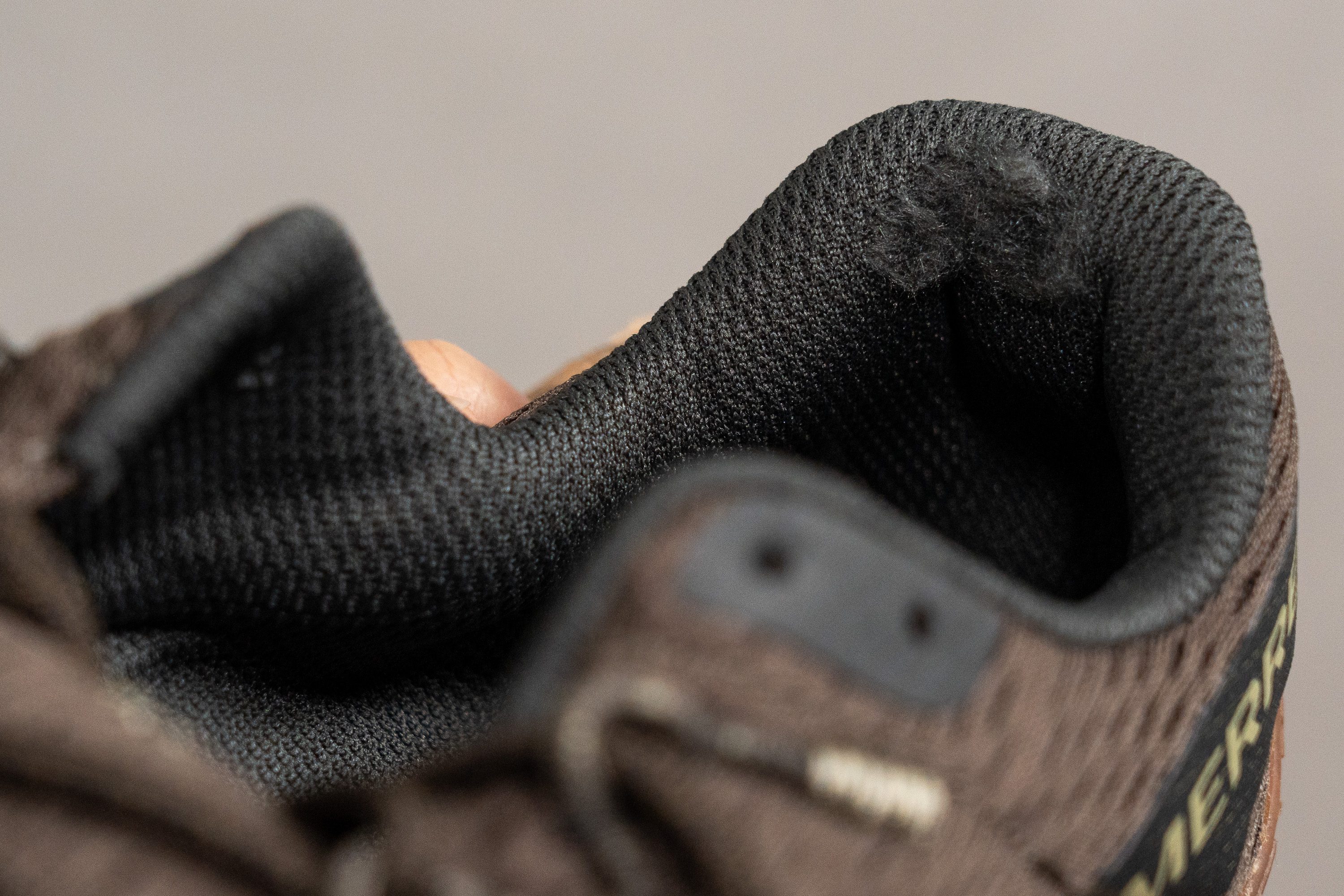
| Who should NOT buy | 2 |
| Average | 3.1 |
Outsole hardness
The outsole of the Vapour Glove is made by Vibram. That equals fantastic grip.
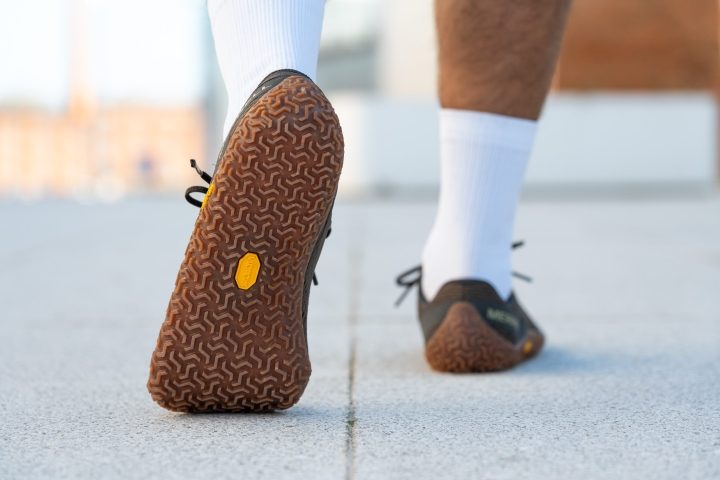
Top 1% in.
However, this time Vibram provided the EcoStep Recycle rubber. It's softer (75.6 HC) than other compounds from the Italian company, like Megagrip, and also softer than the average shoe's rubber.
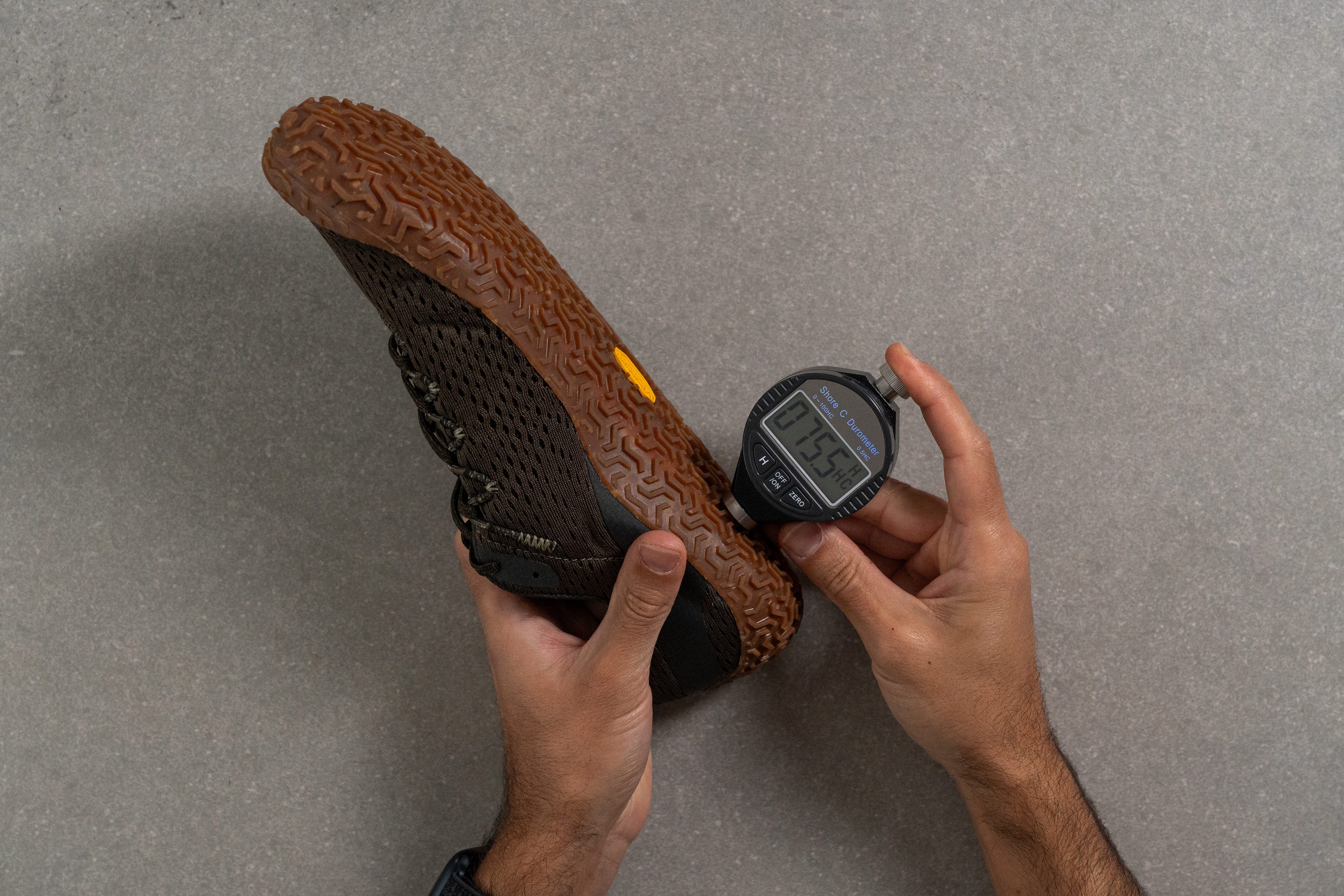
| Who should NOT buy | 75.6 HC |
| Average | 80.5 HC |
Outsole durability
Given its softness, we had doubts about its durability.
Unfortunately, those doubts were confirmed when we found a 1.5-mm indentation in the outsole after our Dremel test in the lab, suggesting it might wear down faster than anticipated.
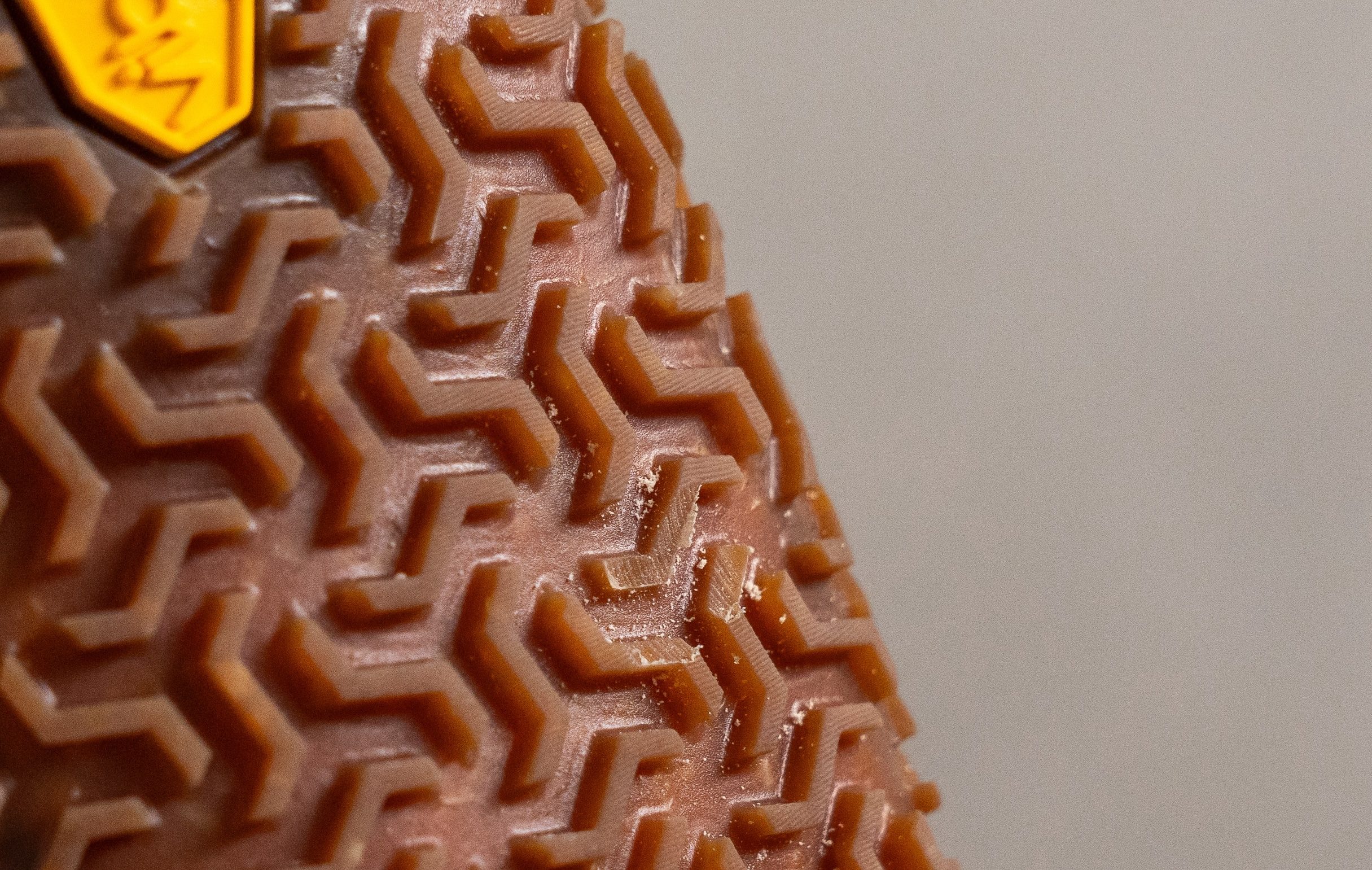
| Who should NOT buy | 1.5 mm |
| Average | 0.9 mm |
Outsole thickness
Fortunately, Merrell requested a thick outsole from Vibram, and we found they delivered with a 3.9-mm one, which is beneficial considering the results of our previous tests.
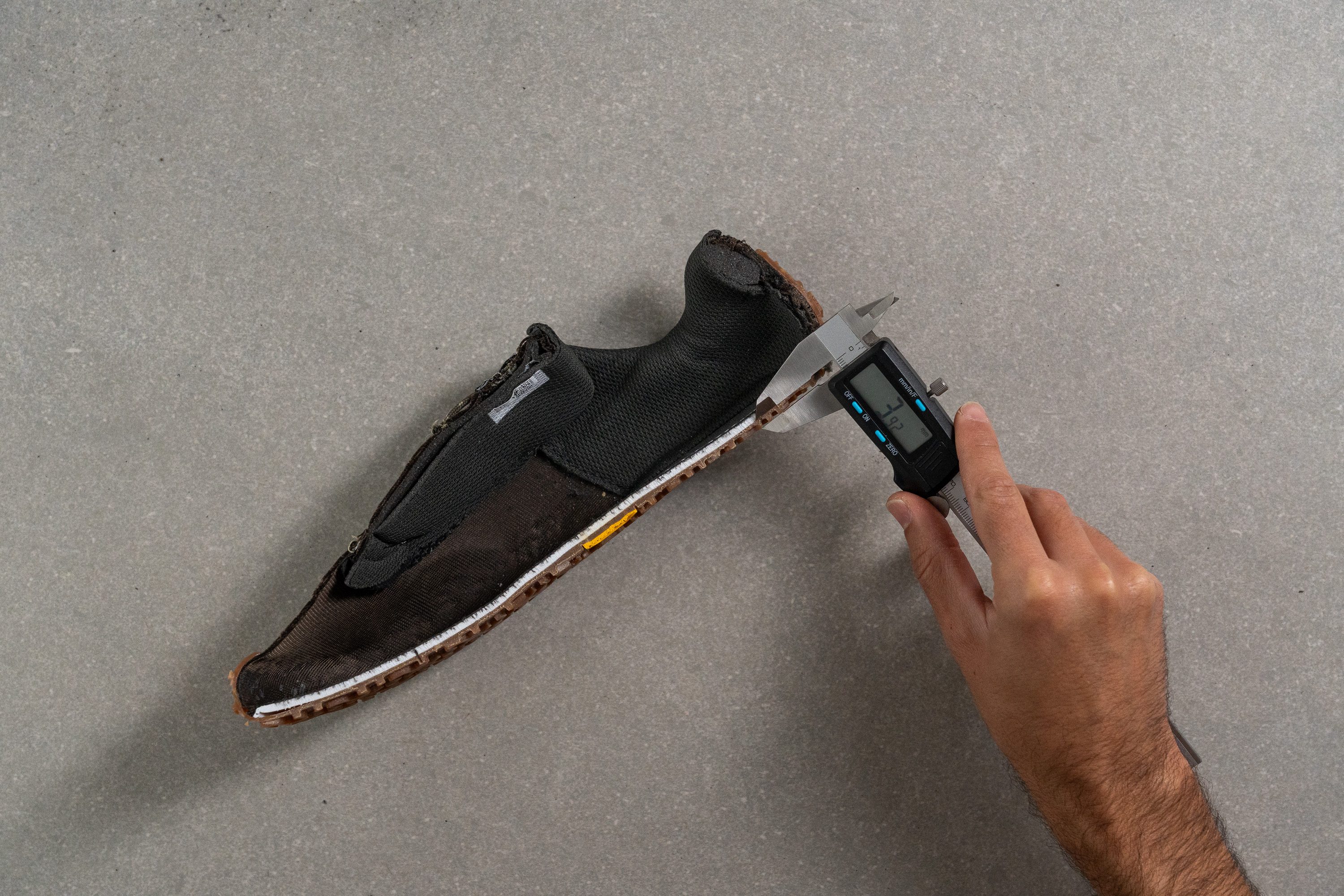
| Who should NOT buy | 3.9 mm |
| Average | 3.2 mm |
Weight
Weighing just 5.6 oz (159g), the Vapour Glove 6 is among the lightest shoes we've tested in the lab. However, don't be fooled—its lightness is mainly due to the absence of a midsole.
The video really speaks for itself.
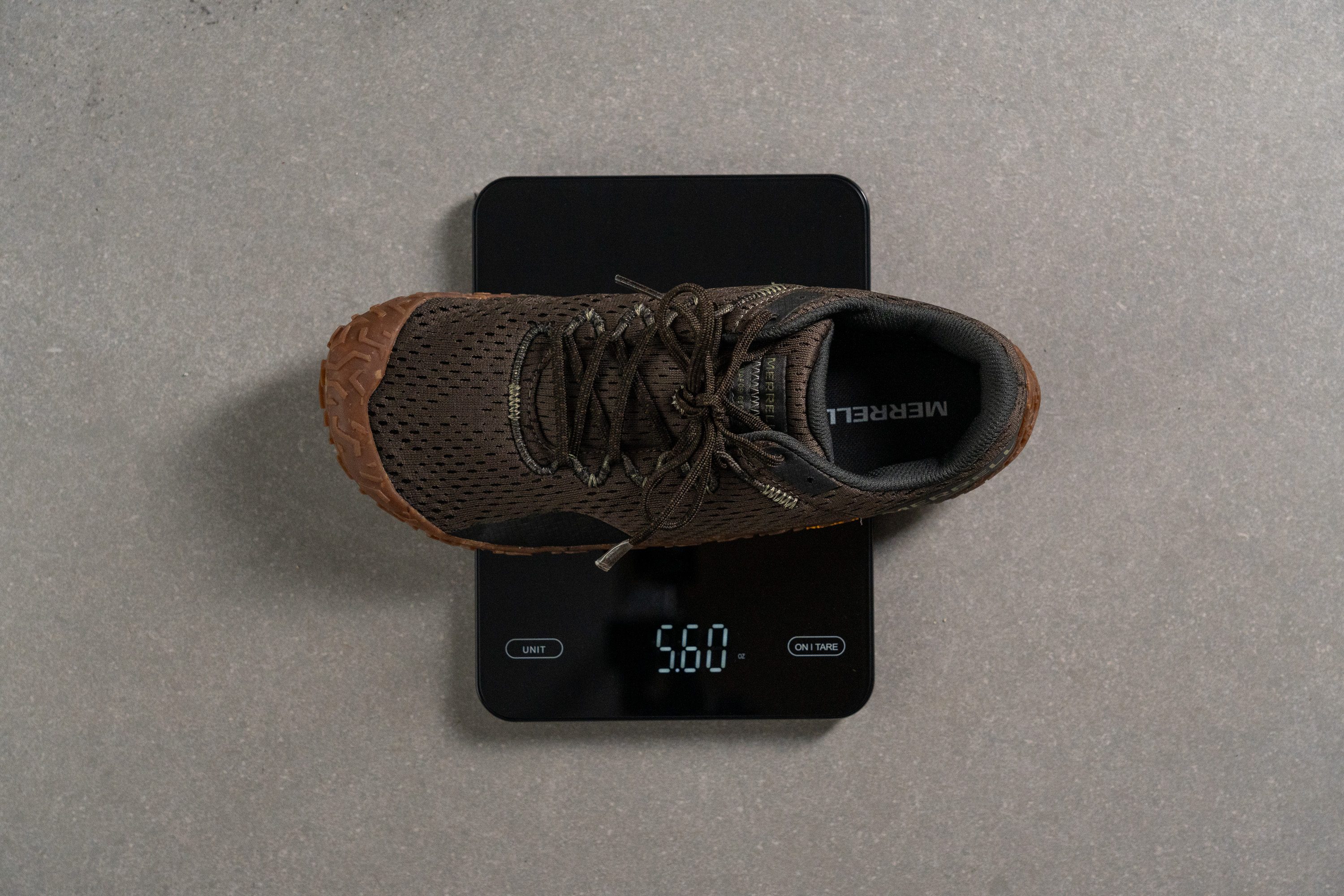
| Who should NOT buy | 5.61 oz (159g) |
| Average | 9.35 oz (265g) |
Cushioning
Heel stack
We mentioned that this shoe has no midsole, and that's exactly the case. The heel stack in this shoe amounts to just the outsole and insole combined, at a minimal 7.6 mm.
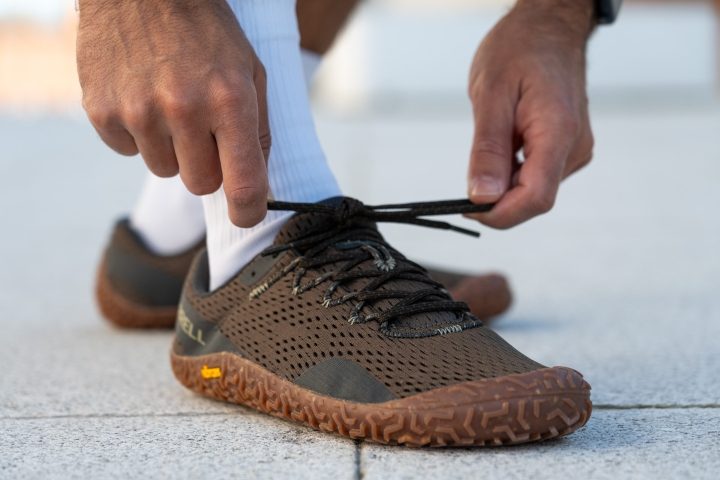
What does this mean? For barefoot enthusiasts, it's great news. However, if you're used to running in cushioned shoes, you'll need to take it step by step with the Vapour Glove 6. There's hardly anything between your feet and the pavement!
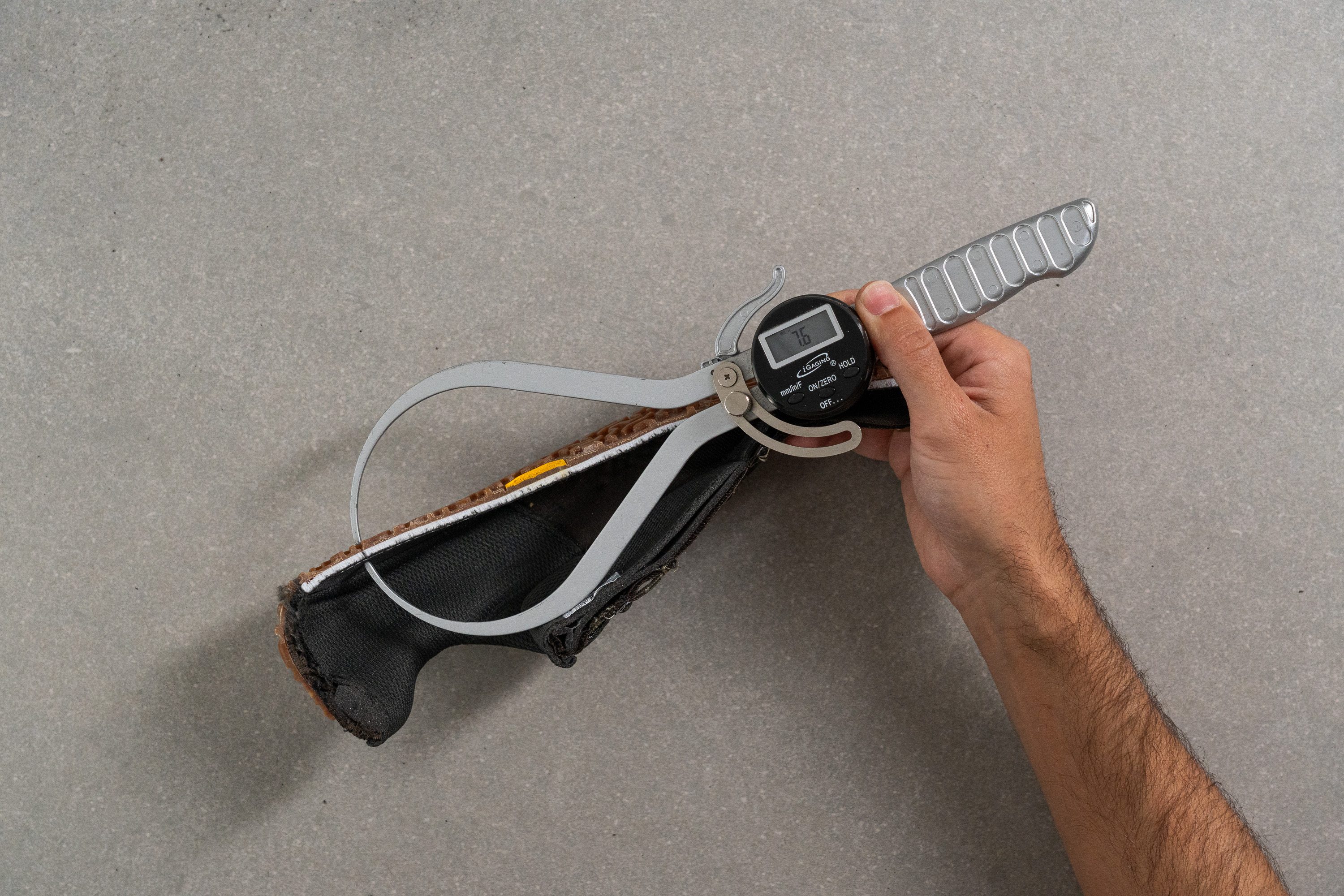
| Who should NOT buy | 7.6 mm |
| Average | 33.6 mm |
Forefoot stack
We took our trusty calipers to the forefoot and found exactly what we were hoping for in a true barefoot shoe—a consistent 7.6-mm stack height. Fantastic!
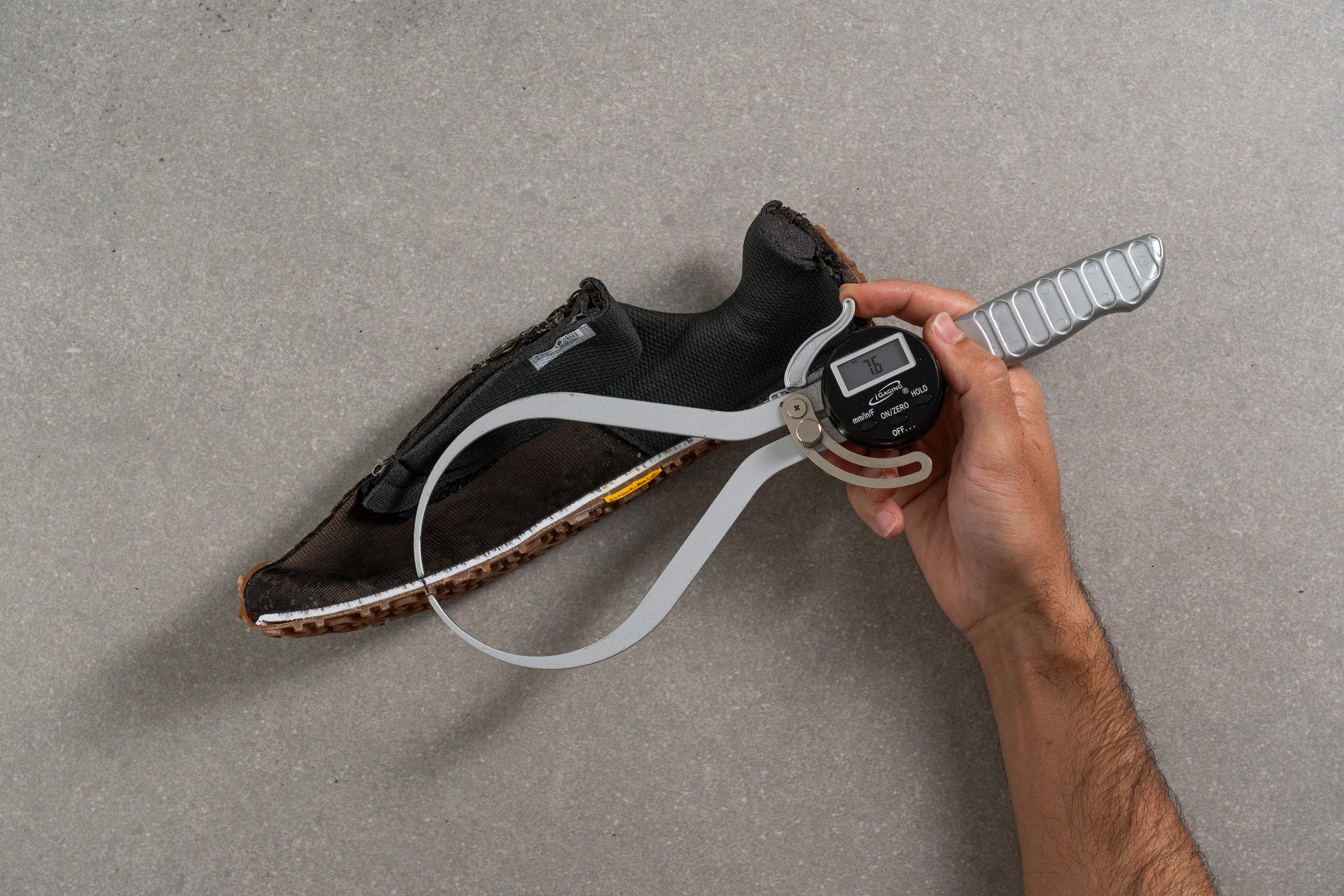
| Who should NOT buy | 7.6 mm |
| Average | 25.0 mm |
Drop
Naturally, subtracting the forefoot from the heel measurement gives us a true, unequivocal 0.0 mm drop.
While this might seem obvious for a zero-drop shoe, manufacturing tolerances often lead some shoes to stray slightly from the perfection achieved by the Vapour Glove 6. Of course, the lack of a midsole certainly contributes to this precision...
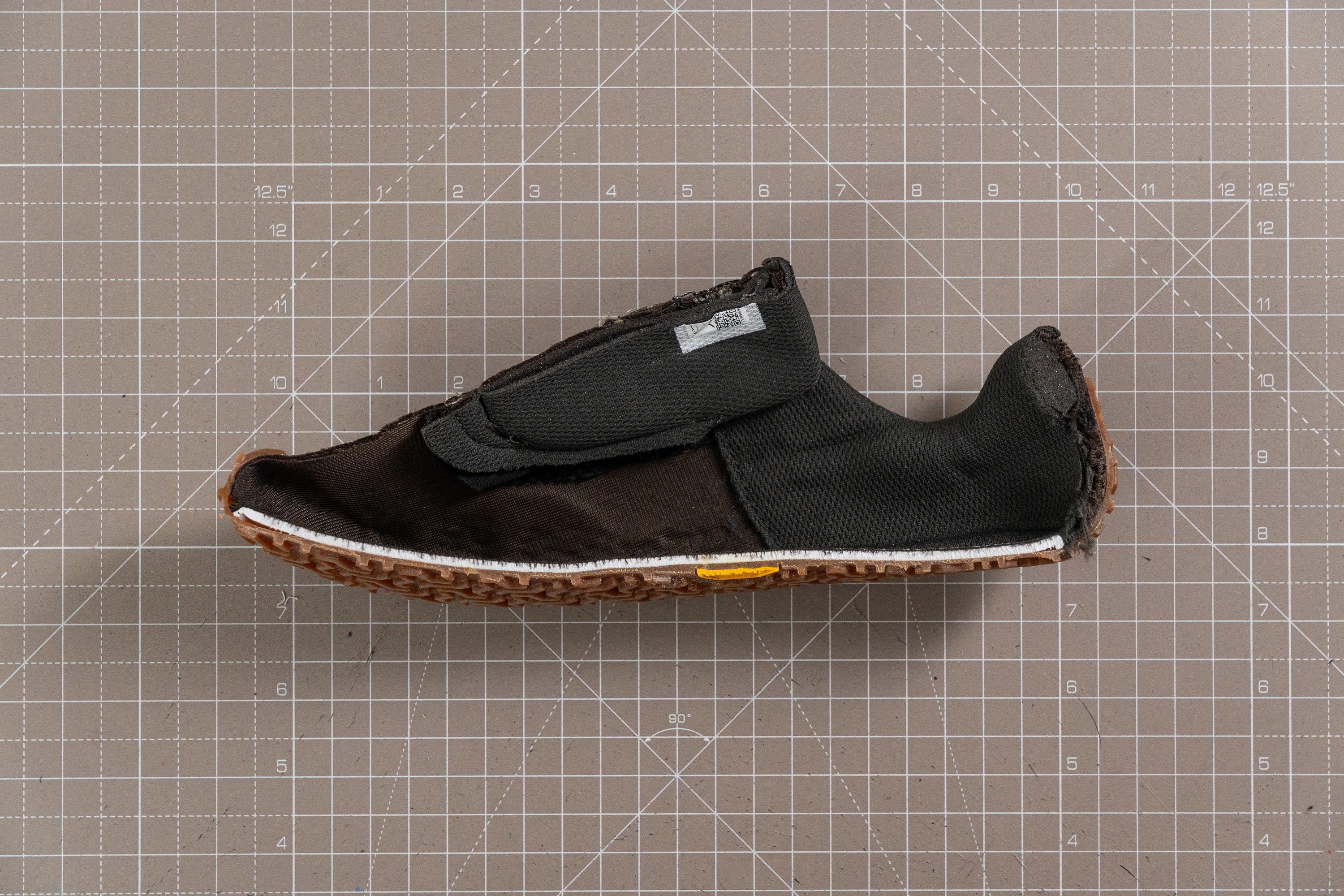
| Who should NOT buy | 0.0 mm |
| Average | 8.6 mm |
Insole thickness
The EVA-based insole measured 3.8 mm, and it's the only cushioning you'll feel in this shoe.
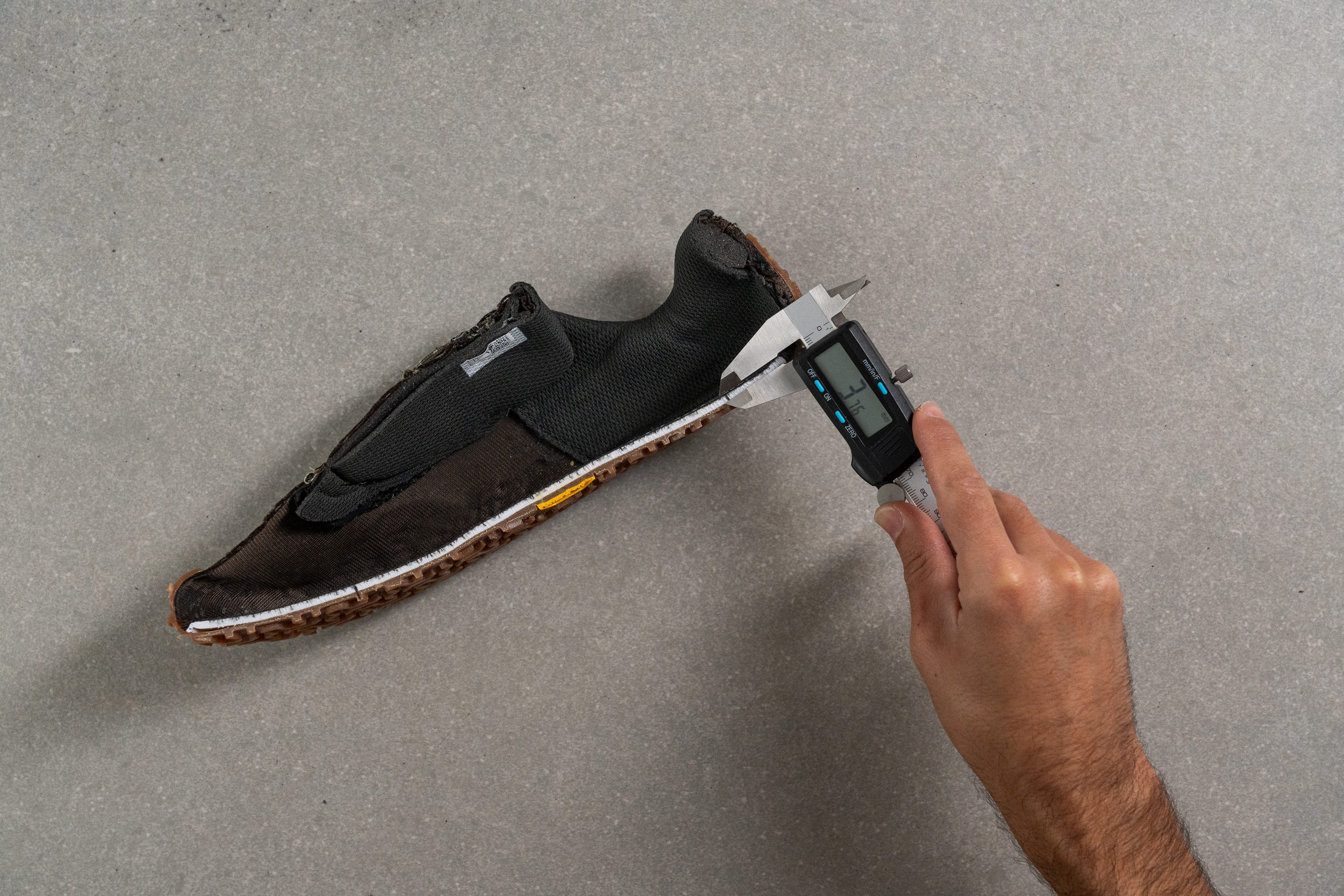
| Who should NOT buy | 3.8 mm |
| Average | 4.5 mm |
Secondary foam softness
The outsole of the Vapour Glove is made by Vibram. That equals fantastic grip.

Top 1% in.
However, this time Vibram provided the EcoStep Recycle rubber. It's softer (75.6 HC) than other compounds from the Italian company, like Megagrip, and also softer than the average shoe's rubber.
Stability
oz / 150g
Another huge advantage of not having a midsole and being extremely connected to the ground is the stability it offers. And the huge sidewalls also play a big role acting as a support element.
The Vapour Glove 6 is as stable as your feet, and it feels amazing while running. Oh, and these things just love taking corners at full speed... just saying.
Torsional rigidity
The torsional rigidity test is crucial for barefoot and minimalist enthusiasts, and we're happy to confirm that the Vapour Glove 6 is extremely flexible, scoring a 1/5 for us.
The video really speaks for itself!
| Who should NOT buy | 1 |
| Average | 3.2 |
Heel counter stiffness
The story is the same with the heel counter. There are no added stability elements, no intrusive heel counters, absolutely nothing.
| Who should NOT buy | 1 |
| Average | 2.8 |
Midsole width in the forefoot
Now, let's look into the midsole dimensions. In the forefoot, we measured a maximum of 104.6 mm, which is actually high for this type of shoe!
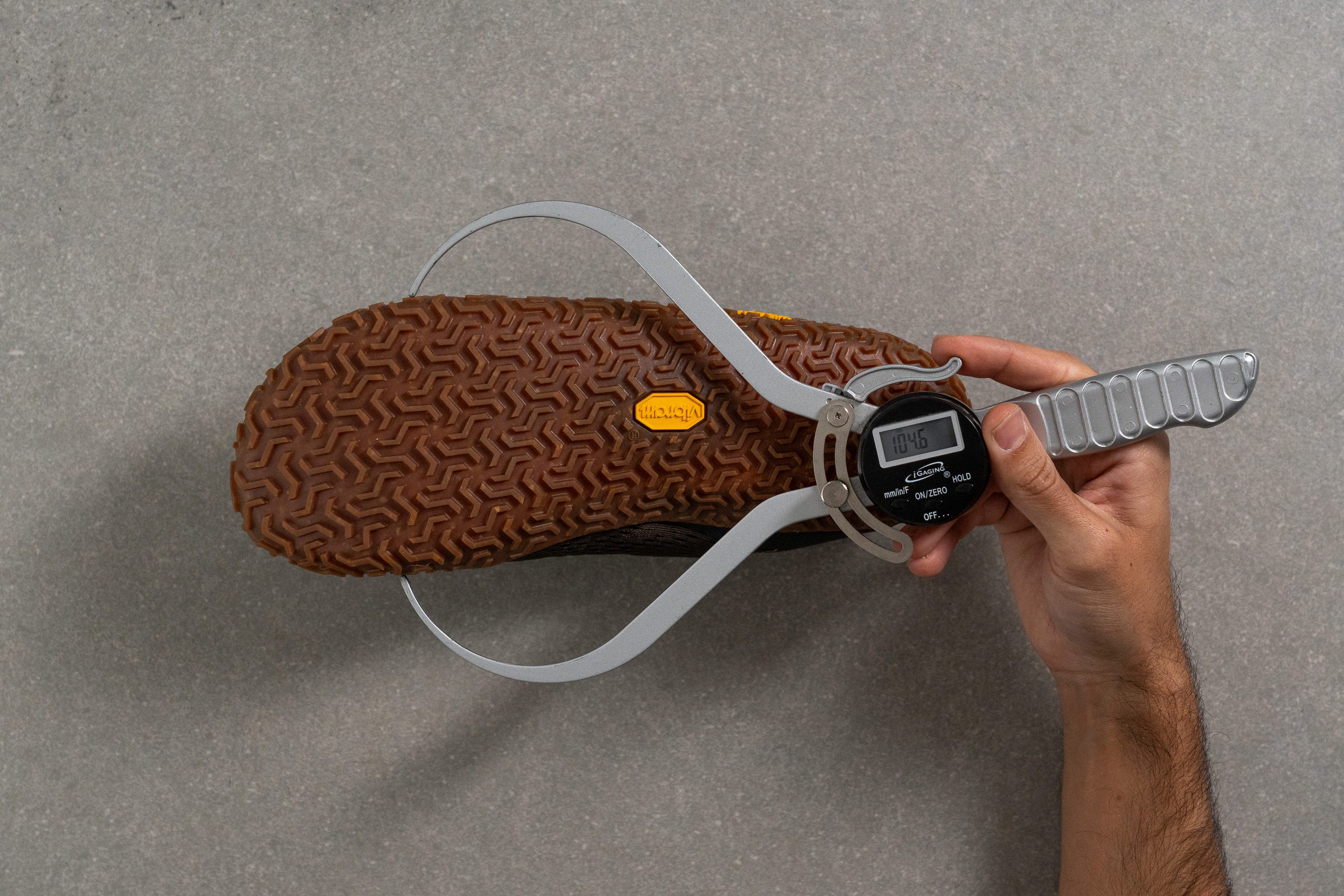
| Who should NOT buy | 104.6 mm |
| Average | 113.7 mm |
Ideal for those with wide feet
The heel measured 77.0 mm, in line with our expectations. These foot-shaped shoes always tend to get really narrow in this area, and that's exactly as it should be to fit like a glove.
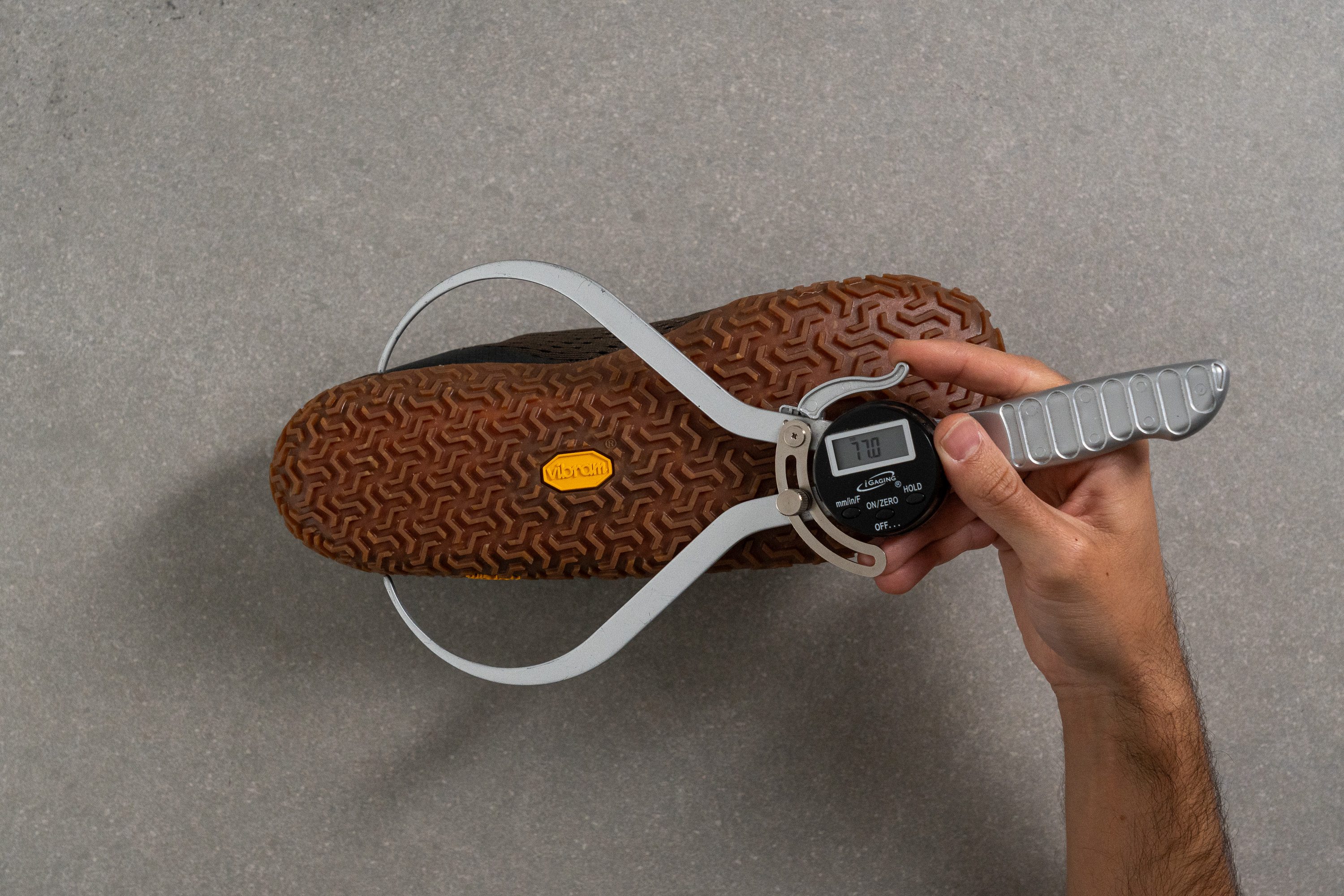
| Who should NOT buy | 77.0 mm |
| Average | 90.5 mm |
Flexibility
Stiffness
Doing this test was pretty cool. Usually, we have to apply some serious force, but this time we had to be super careful to push just lightly enough to avoid going past the 90-degree point.
And the result? A jaw-dropping 2.2N of force, proving that this shoe is incredibly bendable!
| Who should NOT buy | 2.2N |
| Average | 29.1N |
Stiffness in cold
Following a 20-minute freeze, just like we did for the midsole softness test, we repeated the flexibility test. This time, the result was nearly identical at 2.5N.
| Who should NOT buy | 2.5N |
| Average | 38.4N |
Difference in stiffness in cold
With just a 12.7% increase, you won't notice any difference, even in cold temperatures.
| Who should NOT buy | 12.7% |
| Average | 36.2% |
Size and fit
Toebox width at the widest part
But one aspect where Merrell's approach to minimalism truly excels is the spacious toebox.
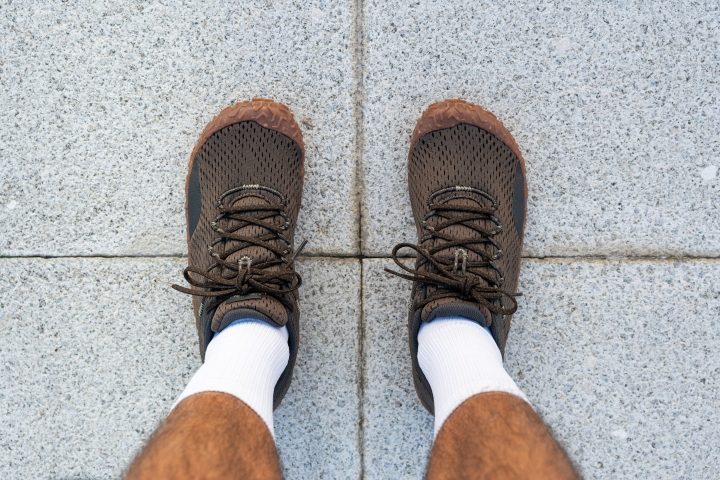
Despite appearing just average on paper at 98.3 mm, it feels like a grand mansion in a barefoot shoe. This is fantastic news for those with wide feet who often struggle to find shoes that offer such generous room.
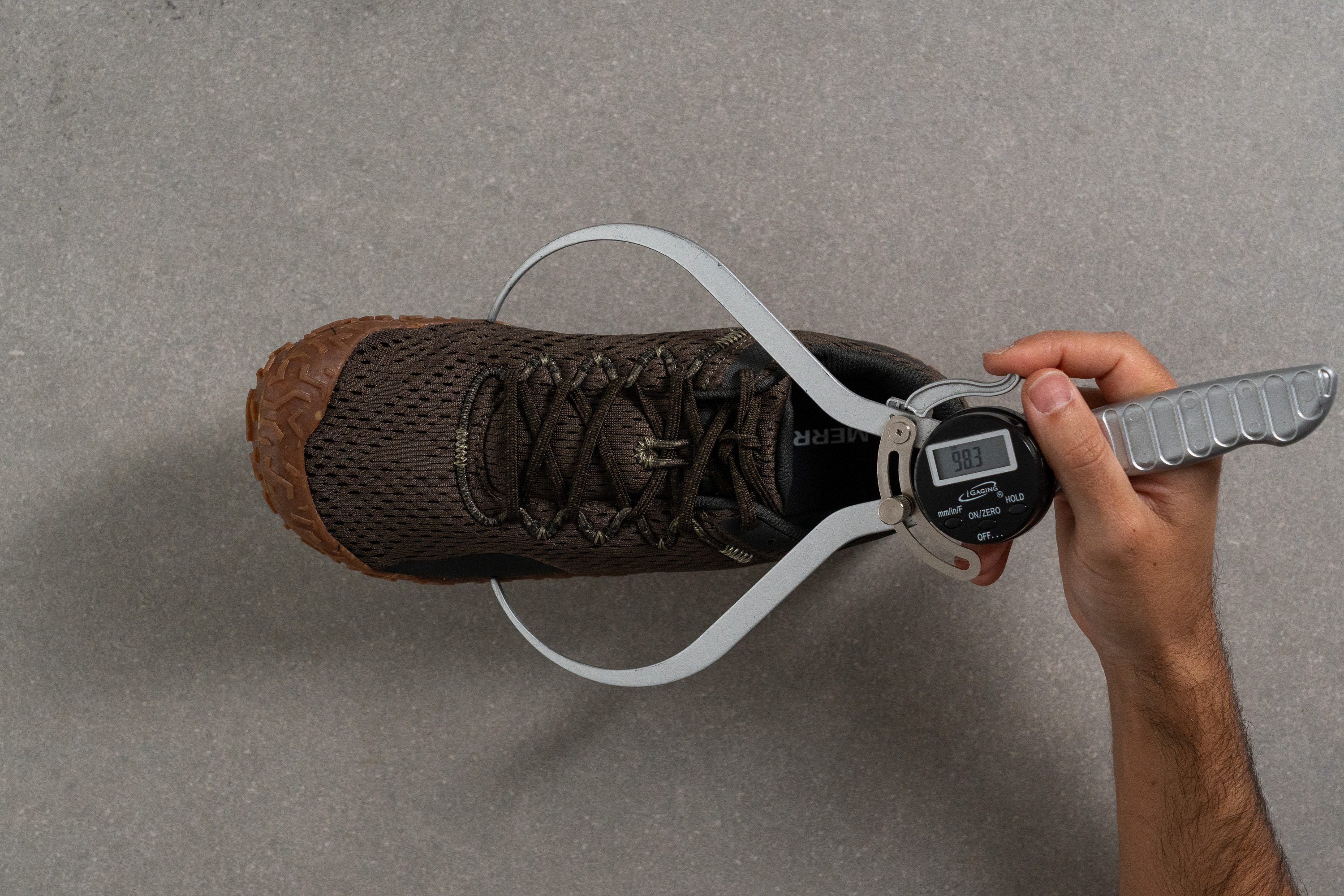
| Who should NOT buy | 98.3 mm |
| Average | 98.3 mm |
Toebox width at the big toe
The big toe area is a major contributor to the ample space inside the shoe. With an incredible width of 84.8 mm, any foot will have enough room for toe splay inside. It might even be too spacious for those with narrow feet.
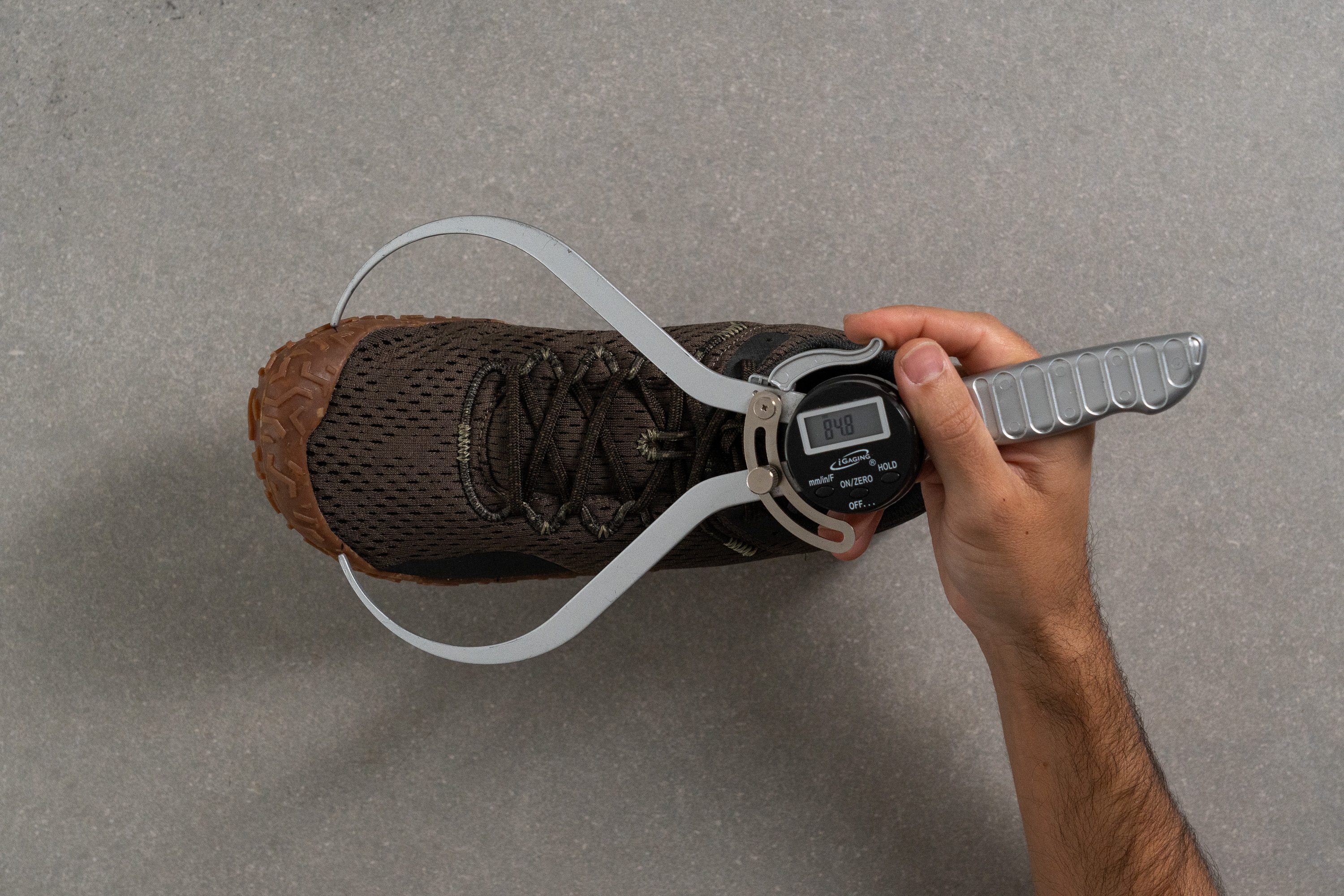
| Who should NOT buy | 84.8 mm |
| Average | 78.2 mm |
Tongue: gusset type
The tongue is semi-gusseted, which is a nice bonus for those light trail adventures filled with small rocks and debris. In our opinion, Merrell deserves a bonus point for including this feature in a £100 shoe.
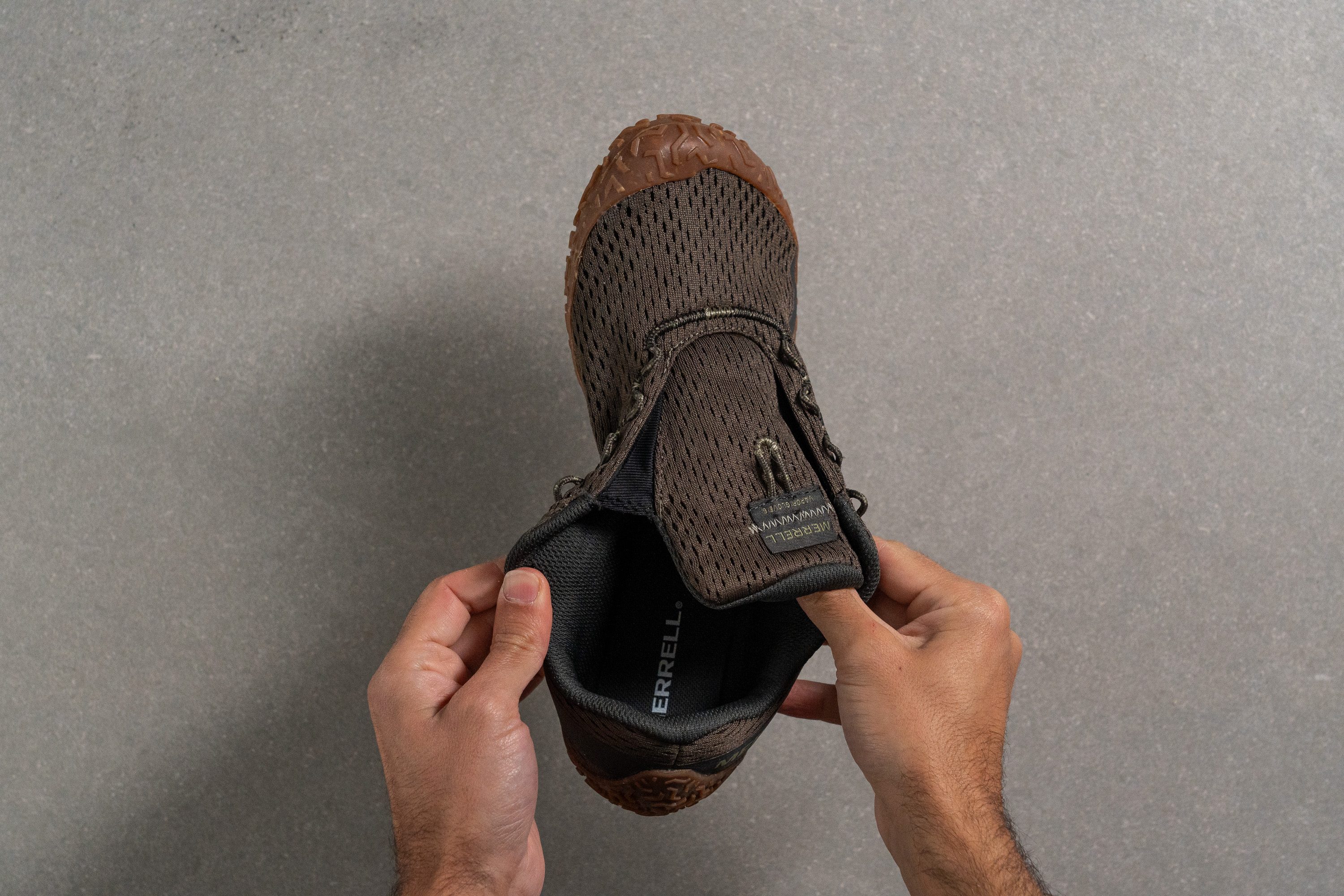
| Who should NOT buy | Both sides (full) |
Comfort
Tongue padding
This is pretty wild—the tongue is actually thicker than the shoe's stack height!
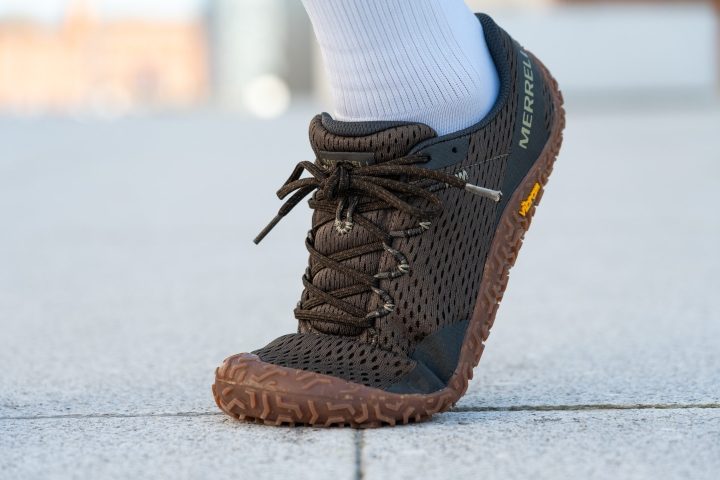
We're talking 8.2 mm thick here. It looks like Merrell really wanted to amp up the comfort in the upper as much as they could.
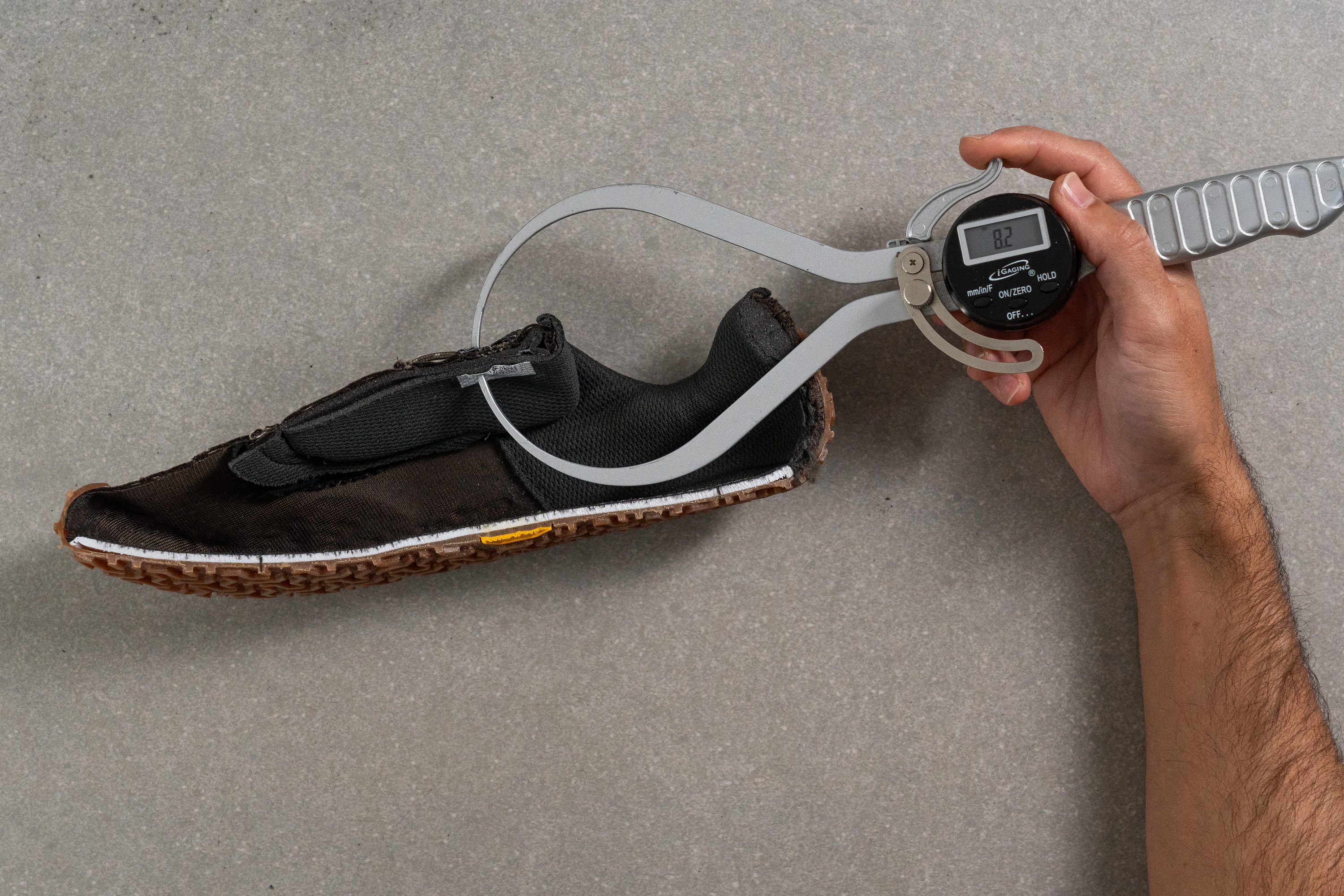
| Who should NOT buy | 8.2 mm |
| Average | 5.6 mm |
Heel tab
There's no heel tab on the Vapour Glove, but we don't think it would fit with the design anyway, so it's all good!
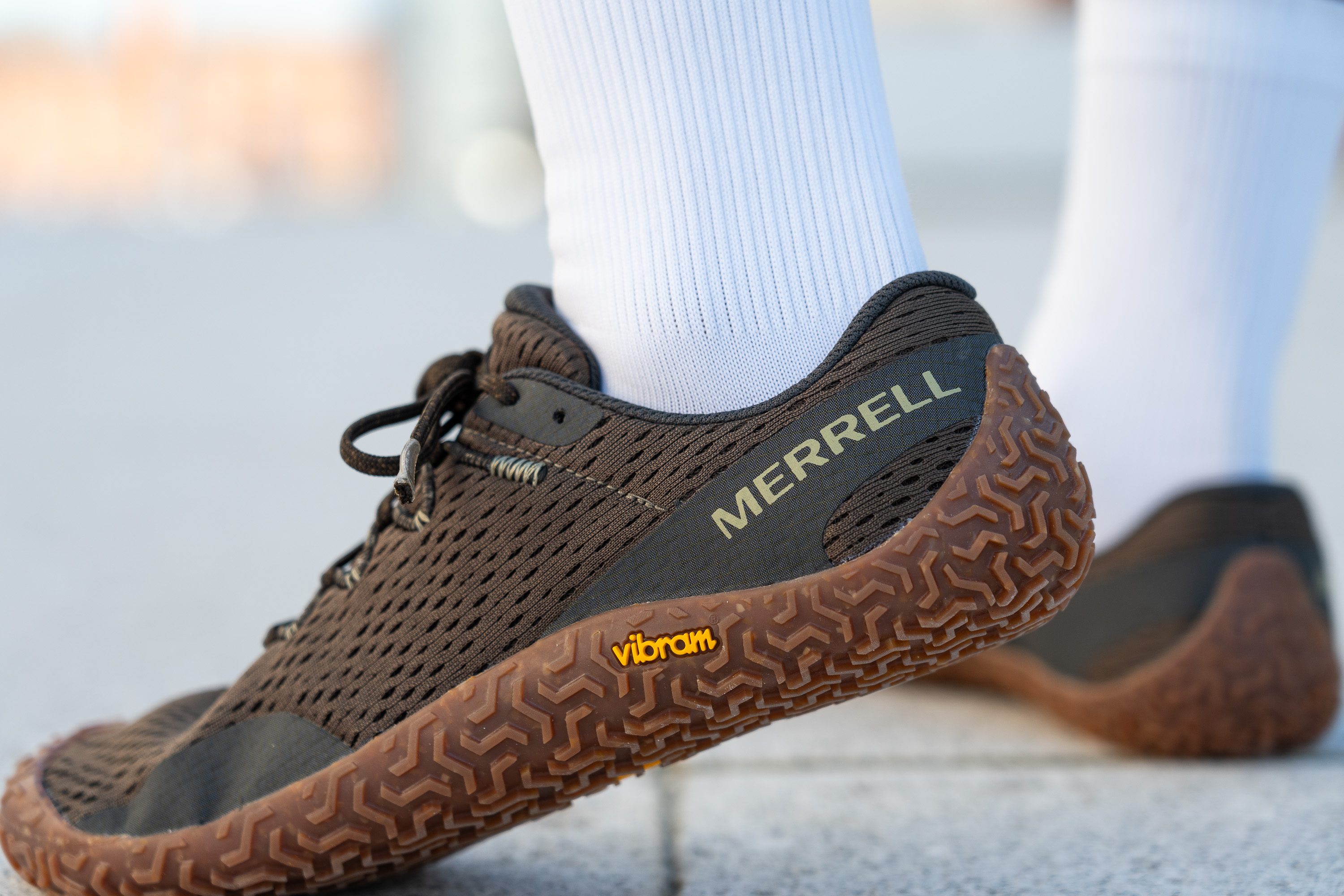
| Who should NOT buy | None |
Removable insole
The insole is glued in and can't be removed. Additionally, the shoe's shape and its minimalist design don't make it suitable for third-party insoles.
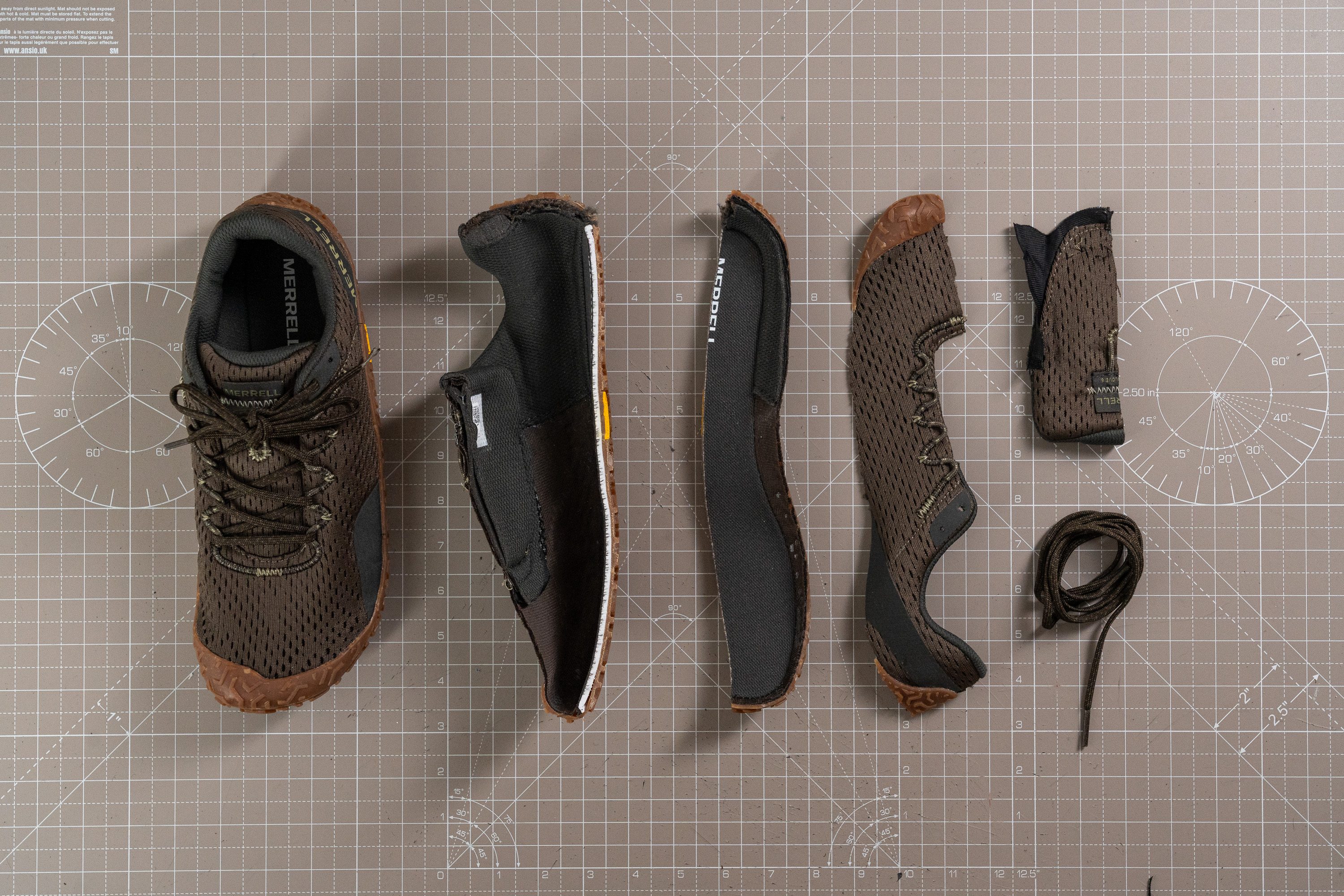
| Who should NOT buy | No |
Misc
Reflective elements
At just £100, we weren't expecting any reflective elements at all, and that's what we got.
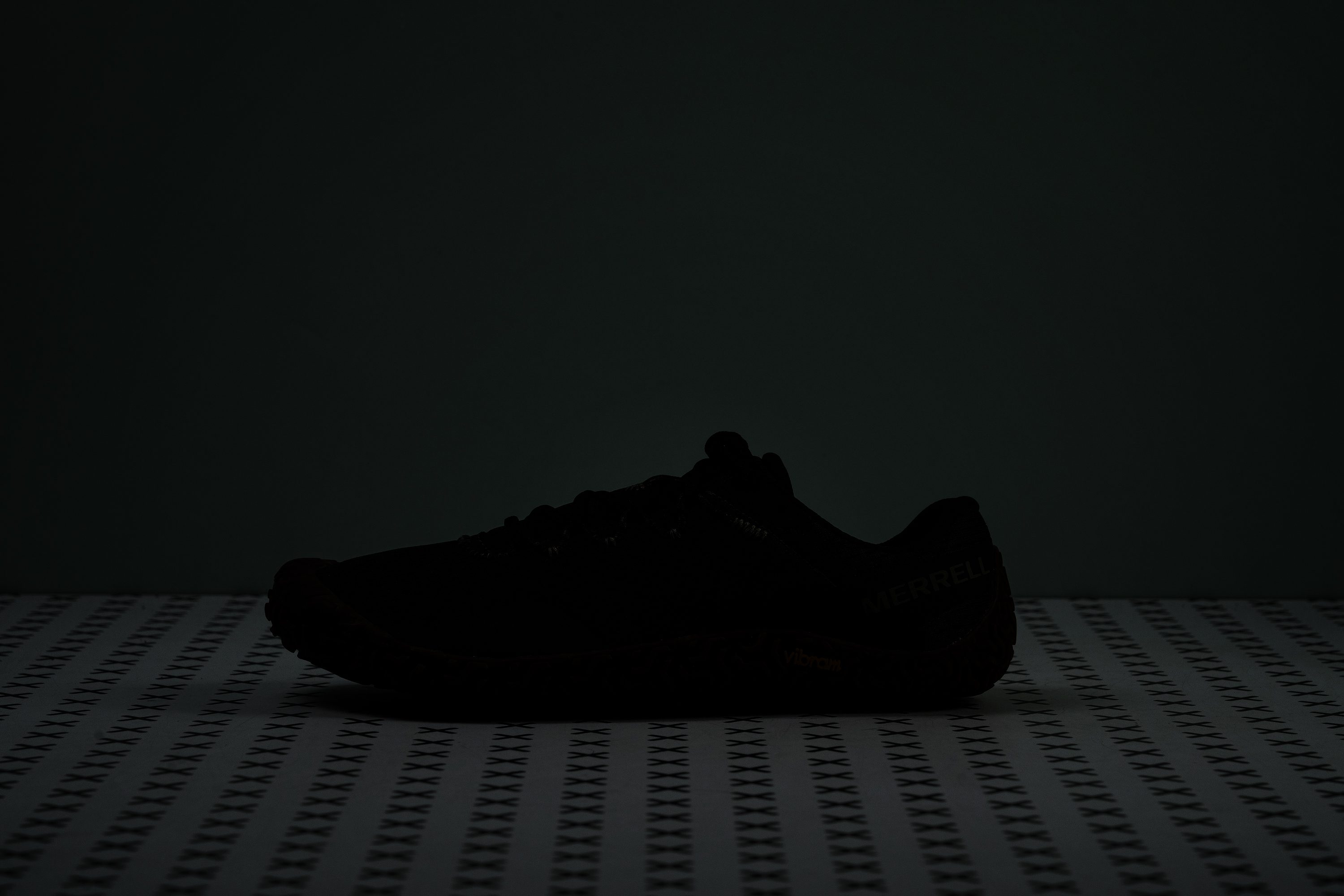
| Who should NOT buy | No |

